In a world where reliable electricity is not a luxury but a necessity for everyday life, the citizens of many nations find themselves grappling with the dire consequences of erratic power supply. Nigeria, Africa’s most populous nation, is no exception.

The persistent issue of epileptic power supply has plagued the nation for decades, causing immense frustration and hindering socio-economic development. As citizens endure blackouts and voltage fluctuations, the blame game ensues, often pointing fingers at the government’s failure to address the root causes.
One of the key factors exacerbating Nigeria’s power woes is the persistent reliance on fossil fuels, particularly the issue of fuel subsidy removal. While the government may justify such measures as necessary for economic reform, the repercussions on the populace, particularly in terms of energy access, cannot be overlooked. The removal of fuel subsidies in 2024 has leads to increased costs of living, further burdening the already struggling masses.
With the government set to inject N1.6 billion for on-grid electricity subsidise through the 11 electricity Distribution Companies (DISCOs), we must not forget the over 45% of the population without electricity mostly in rural areas, and the poor electricity supply by the on-grid players who lack transparency and accountability, poor metering plans and lack a grid expansion plan – as much as we know it.
However, amidst the gloom and discontent lies a potential solution: the shift from centralised power generation to Distributed Renewable Energy (DRE). Unlike traditional fossil fuel-based grids, DRE systems harness energy from abundant renewable sources such as sunlight, wind, and water, offering a decentralised and sustainable alternative. Yet, despite its potential to revolutionise energy access, DRE adoption remains hindered by various challenges, including high cost for renewable solutions, lack of available consumer financing for poor informal groups, inadequate incentives to transit to clean energy solutions and policy frameworks that are not implemented.
One glaring irony is the failure of governments to reallocate subsidies from fossil fuels to incentivise DRE adoption so as to ease the suffering of the masses and bridge energy access. Instead of perpetuating dependency on finite resources with volatile prices like fossils, the governments should redirect these funds towards promoting renewable energy solutions that empower citizens and foster resilience against power disruptions.
Imagine a scenario where generators anxiously allocated to fuel subsidies are channeled into initiatives that promote DRE adoption at the grassroots level and medium and small-scale businesses across Nigeria – boosting their production activities, cutting business operating cost by 40% which was previously used to fuel generators, and creating more jobs.
Subsidies could be redirected to subsidise the cost of solar panels, wind turbines, or mini-hydro systems, making renewable energy technologies more accessible to households and businesses alike. Additionally, government-backed incentives such as tax breaks, grants, and low-interest loans could spur investment in DRE projects, stimulating economic growth while addressing energy poverty.
Furthermore, investing in DRE infrastructure not only enhances energy access but also mitigates environmental degradation and reduces greenhouse gas emissions, contributing to global efforts to combat climate change. By embracing renewable energy, nations like Nigeria can position themselves as leaders in sustainable development, harnessing their abundant natural resources to drive progress while safeguarding the planet for future generations.
The shift towards DRE is not merely a matter of technological advancement but a paradigm shift in governance and energy policy. Governments must prioritise the welfare of their citizens by investing in resilient, decentralised energy systems that provide reliable power and empower communities to thrive. And where the government feels its lacking resource and technical capacities to deliver reliable decentralised energy, it must explore partnership and support the work of development partners and private sector players making bold investment and delivering support to make DRE accessible to Nigerians.
For instance, international partners like All On, is stepping forward to transform Nigeria’s energy landscape. Since inception, All On has facilitated over 80,000 off-grid solar connections, revolutionising energy access across the nation. Collaborating with 50 off-grid energy companies, they’ve enabled 8,000+ mini-grid connections, sold 45,000+ solar home systems, and empowered 2,500+ users with solar refrigerators.
Their impact extends beyond numbers: 14 MWh of installed capacity, cutting 29,000+ MT of CO2 emissions, and generating 1,900 kWp of power across 21 mini-grid sites. Moreover, over 400,000 lives have been directly impacted, with 800 jobs created and 560 businesses powered by clean energy, fostering socio-economic growth from the grassroots.
The success of All On’s initiatives underscores the urgency for decentralised renewable energy adoption. Redirecting subsidies towards DRE initiatives could subsidise solar panels, wind turbines, and mini-hydro systems, making renewable technologies accessible to all.
In conclusion, the plight of epileptic power supply underscores the urgent need for proactive measures to transition towards a more sustainable energy future. By shifting subsidies from fossil fuels to Distributed Renewable Energy, governments can not only alleviate the burden on citizens but also catalyse a green energy revolution that benefits both people and the planet.
As Nigeria navigates towards a greener future, partnerships like All On exemplify the transformative power of decentralised renewable energy. Together, we can illuminate a path towards prosperity, driven by clean, decentralised energy solutions that empower communities and protect the environment. It’s time to shift subsidies, energise communities, and embrace a brighter tomorrow for all.
Let’s Light up Nigeria.
Chisom Clement John is with REAN, Abuja

This is a welcome development as renewable energy must becomes best mitigation option for carbon emissions reduction to tacling the menace of climate change in Nigeria especially decenteralized rural electrification mini grids.